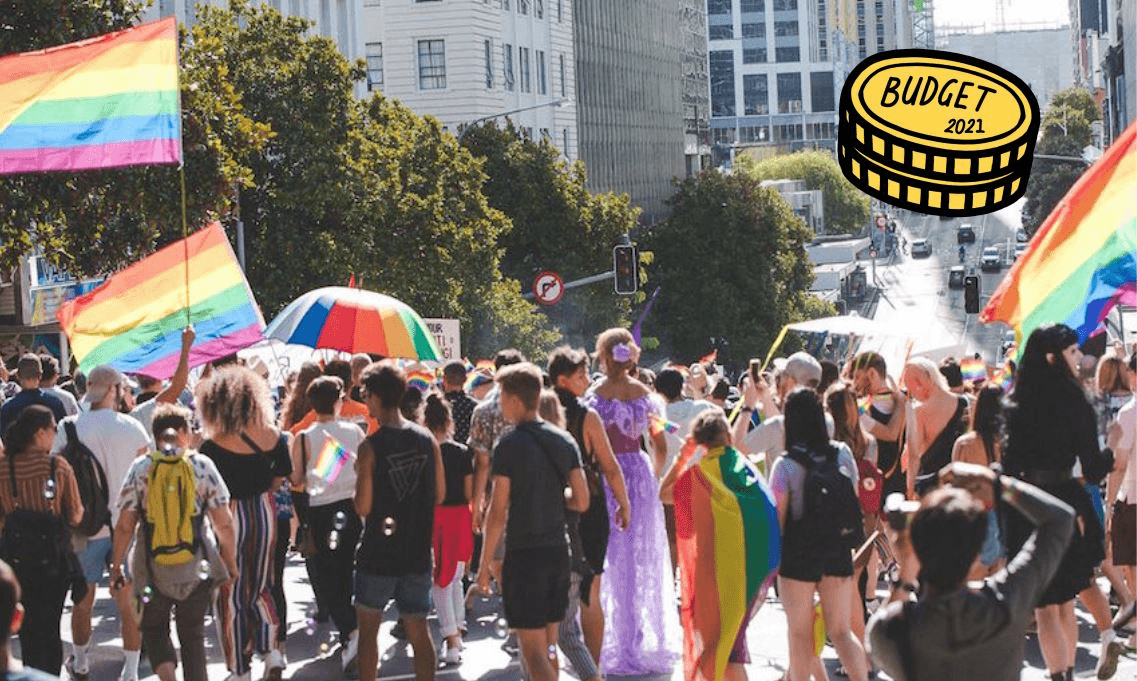Auckland Pride director Max Tweedie look at what what was in Thursday’s budget for Aotearoa rainbow communities, and suggests how the government could supercharge its support.
Last week’s was once again disappointing for Aotearoa’s Rainbow Communities, with minimal funding to address significant disparities that our communities experience. While we’ve had our eyes on significant legislative changes, it’s now time for the government to take a holistic approach to our wellbeing, and establish a Rainbow Ministry.
Let’s start with what was funded. The New Zealand Aids Foundation’s funding wasn’t confirmed in this budget (it’s “not yet known”), but it’s likely to stay the same as it has for more than 10 years, at just $4.23m. While the government has signed on to support the Foundation’s goal to end new HIV transmissions by 2025, and HIV transmission numbers are on the decline, there’s a significant opportunity to achieve this goal with increased understanding of public health concepts and new tools to both prevent new HIV transmissions and support people living with HIV.
Funding for gender affirmation surgeries also remains at a low $748k a year, which equates to 14 surgeries a year for a waitlist that currently sits at 276. With new referrals significantly outpacing surgeries actually performed, there’s minimal capacity for trans people to get timely, affirming surgeries that have significant benefits for their wellbeing. The government not only needs to significantly expand this funding, increase and invest in the workforce that can perform these surgeries, but grow the capacity of the health system to address the crisis in trans healthcare.
Outside of the Budget, the government announced $4m for targeted rainbow mental health. $800k of this went towards topping up the rainbow wellbeing legacy fund, and a contestable fund for organisations to deliver projects towards improving rainbow mental health. Which is fantastic, but isn’t enough to tackle rates of depression and attempted suicide that are almost four times higher for those with diverse sexual orientations, and for trans and non-binary people rates of psychological distress are nine times higher than the general population.
Including initiatives to tackle rainbow homelessness, funding for sexual health research, and Covid-19 related boosts in funding for OutLine, this comes to about $10m in the last year. While obviously our communities will benefit from specific investment from general funding pools, we face an uphill battle with being named as priority populations in key documents that influence funding decisions, as well as not having dedicated advocates within Ministries that can advocate on our behalf to fund projects that will benefit our communities.
Meanwhile activists across our communities have been putting our limited resources into advocating for law changes, to be recognised in the human rights act, a ban on conversion therapy, hate speech laws, allowing self identification on birth certificates, banning non-consensual surgeries on intersex babies, and a raft of other legislative changes to arrive at legal parity as outlined in the landmark Prism report by the Human Rights Commission.
What’s been missing from this equation is a well resourced body coordinating a work programme to implement these changes, to identify and resource our communities working towards equality, and advocating within government for change. I’ve long been a supporter of a Rainbow Ministry, and I believe that we wouldn’t have been left invisible from a budget that allocated our communities 0.004% of the government’s spending if we’d had one. A Rainbow Ministry would grow the capacity of the public sector to support, empower, and grow the ability of the government to respond to and resource our communities, and the Budget could’ve included initiatives such as:
Significantly increase funding for our national rainbow organisations to deliver transformational national programmes that support the wellbeing of and empower our communities. The combined operational revenue of the country’s rainbow organisations amount to even less than is allocated in the budget – and we represent around 10% of the population. These organisations are run for and by our community and provide critical peer support and programmes that are life saving.
Use the model that was rolled out after the expungement of convictions prior to homosexual law reform to create funding opportunities nationwide to mitigate the impacts of other discriminatory laws. This could include funding to support survivors of conversion therapy, victims of hate crimes, or those who have had non-consensual intersex surgeries performed on them.
Targeted funding across the education, arts, and events sectors to better support story-telling, visibility, that complements the above law changes and funding, to further propel progress and understanding of the various experiences of our rainbow communities.
The government has made some fantastic announcements this year for our rainbow communities, and we’re excited for the progress that will be made in this term of Parliament across Labour’s rainbow manifesto. But there’s more work to do, and the government has an opportunity to use its majority to establish a Rainbow Ministry and secure resourcing for our communities for years to come.





